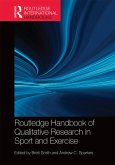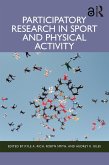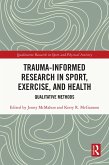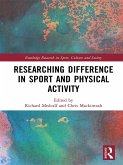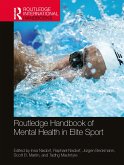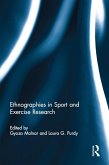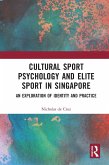Routledge Handbook of Qualitative Research in Sport and Exercise (eBook, ePUB)
Redaktion: Smith, Brett; Sparkes, Andrew C.
57,95 €
57,95 €
inkl. MwSt.
Sofort per Download lieferbar

29 °P sammeln
57,95 €
Als Download kaufen

57,95 €
inkl. MwSt.
Sofort per Download lieferbar

29 °P sammeln
Jetzt verschenken
Alle Infos zum eBook verschenken
57,95 €
inkl. MwSt.
Sofort per Download lieferbar
Alle Infos zum eBook verschenken

29 °P sammeln
Routledge Handbook of Qualitative Research in Sport and Exercise (eBook, ePUB)
Redaktion: Smith, Brett; Sparkes, Andrew C.
- Format: ePub
- Merkliste
- Auf die Merkliste
- Bewerten Bewerten
- Teilen
- Produkt teilen
- Produkterinnerung
- Produkterinnerung

Bitte loggen Sie sich zunächst in Ihr Kundenkonto ein oder registrieren Sie sich bei
bücher.de, um das eBook-Abo tolino select nutzen zu können.
Hier können Sie sich einloggen
Hier können Sie sich einloggen
Sie sind bereits eingeloggt. Klicken Sie auf 2. tolino select Abo, um fortzufahren.

Bitte loggen Sie sich zunächst in Ihr Kundenkonto ein oder registrieren Sie sich bei bücher.de, um das eBook-Abo tolino select nutzen zu können.
The Routledge Handbook of Qualitative Research in Sport and Exercise is the first book to offer a fully comprehensive survey of established and emerging qualitative methods, from conceptual first principles to practice and process. Written by world-leading qualitative researchers, the book reflects upon the nature of qualitative research in sport and introduces the full range of research traditions within which qualitative researchers work.
- Geräte: eReader
- mit Kopierschutz
- eBook Hilfe
- Größe: 2.7MB
Andere Kunden interessierten sich auch für
![Routledge Handbook of Qualitative Research in Sport and Exercise (eBook, PDF) Routledge Handbook of Qualitative Research in Sport and Exercise (eBook, PDF)]() Routledge Handbook of Qualitative Research in Sport and Exercise (eBook, PDF)57,95 €
Routledge Handbook of Qualitative Research in Sport and Exercise (eBook, PDF)57,95 €![Participatory Research in Sport and Physical Activity (eBook, ePUB) Participatory Research in Sport and Physical Activity (eBook, ePUB)]() Participatory Research in Sport and Physical Activity (eBook, ePUB)41,95 €
Participatory Research in Sport and Physical Activity (eBook, ePUB)41,95 €![Trauma-Informed Research in Sport, Exercise, and Health (eBook, ePUB) Trauma-Informed Research in Sport, Exercise, and Health (eBook, ePUB)]() Trauma-Informed Research in Sport, Exercise, and Health (eBook, ePUB)42,95 €
Trauma-Informed Research in Sport, Exercise, and Health (eBook, ePUB)42,95 €![Researching Difference in Sport and Physical Activity (eBook, ePUB) Researching Difference in Sport and Physical Activity (eBook, ePUB)]() Researching Difference in Sport and Physical Activity (eBook, ePUB)45,95 €
Researching Difference in Sport and Physical Activity (eBook, ePUB)45,95 €![Routledge Handbook of Mental Health in Elite Sport (eBook, ePUB) Routledge Handbook of Mental Health in Elite Sport (eBook, ePUB)]() Routledge Handbook of Mental Health in Elite Sport (eBook, ePUB)46,95 €
Routledge Handbook of Mental Health in Elite Sport (eBook, ePUB)46,95 €![Ethnographies in Sport and Exercise Research (eBook, ePUB) Ethnographies in Sport and Exercise Research (eBook, ePUB)]() Ethnographies in Sport and Exercise Research (eBook, ePUB)46,95 €
Ethnographies in Sport and Exercise Research (eBook, ePUB)46,95 €![Cultural Sport Psychology and Elite Sport in Singapore (eBook, ePUB) Cultural Sport Psychology and Elite Sport in Singapore (eBook, ePUB)]() Nicholas de CruzCultural Sport Psychology and Elite Sport in Singapore (eBook, ePUB)42,95 €
Nicholas de CruzCultural Sport Psychology and Elite Sport in Singapore (eBook, ePUB)42,95 €-
-
-
The Routledge Handbook of Qualitative Research in Sport and Exercise is the first book to offer a fully comprehensive survey of established and emerging qualitative methods, from conceptual first principles to practice and process. Written by world-leading qualitative researchers, the book reflects upon the nature of qualitative research in sport and introduces the full range of research traditions within which qualitative researchers work.
Dieser Download kann aus rechtlichen Gründen nur mit Rechnungsadresse in A, B, BG, CY, CZ, D, DK, EW, E, FIN, F, GR, HR, H, IRL, I, LT, L, LR, M, NL, PL, P, R, S, SLO, SK ausgeliefert werden.
Produktdetails
- Produktdetails
- Verlag: Taylor & Francis eBooks
- Seitenzahl: 518
- Erscheinungstermin: 13. September 2016
- Englisch
- ISBN-13: 9781317646907
- Artikelnr.: 46894313
- Verlag: Taylor & Francis eBooks
- Seitenzahl: 518
- Erscheinungstermin: 13. September 2016
- Englisch
- ISBN-13: 9781317646907
- Artikelnr.: 46894313
- Herstellerkennzeichnung Die Herstellerinformationen sind derzeit nicht verfügbar.
Brett Smith, PhD, is Professor of Physical Activity and Health in the School of Sport, Exercise and Rehabilitation Sciences at the University of Birmingham, UK. His research focuses on disability, sport and physical activity. He is also interested in qualitative inquiry and its possibilities for social change. Brett is Associate Editor of Psychology of Sport and Exercise and serves actively on seven editorial boards, including the Sociology of Sport Journal and Sport, Exercise and Performance Psychology. He is co-author of Qualitative Research in Sport, Exercise and Health: From Process to Product. He is also co-editor of the Routledge book series on Qualitative Research in Sport and Physical Activity. Brett is the founder and former Editor-in-Chief of the international journal Qualitative Research in Sport, Exercise and Health. Andrew C. Sparkes, PhD and professor, is currently with the Institute for Sport, Physical Activity and Leisure, at Leeds Beckett University, UK. His research interests are inspired by a continuing fascination with the ways that people inhabit and experience their bodies differently over time, and in a variety of contexts. To explore such experiences he draws on life history, ethnography, auto-ethnography and narrative approaches. Andrew is co-author of Qualitative Research in Sport, Exercise and Health: From Process to Product, and co-editor of Advances in Biographical Methods: Creative Applications, both published by Routledge.
1. Introduction: An invitation to qualitative research PART I: Traditions
of Qualitative Research 2.Breathing in life: Phenomenological perspectives
on sport and exercise 3. Doing grounded theory in sport and exercise 4.
Narrative Inquiry: From cardinal to marginal...and back? 5. Ethnography 6.
Case studies 7. Feminisms 8. Embarking on community based participatory
action research: A methodology that emerges from (and in) communities PART
II: Collecting Qualitative Data 9. Interviews: Qualitative interviewing in
the sport and exercise sciences 10. Conducting observations in sport and
exercise settings 11. Visual research methods 12. Media research: From text
to context 13. Using material objects and artifacts in research 14.
Documents of life - from diaries to autobiographies to biographical objects
PART III: Analyzing Qualitative Data 15.Using thematic analysis in sport
and exercise research 16. Phenomenological analysis in sport and exercise
17. Interpretative phenomenological analysis in sport and exercise: Getting
at experience 18. Critical discourse analysis in sport and exercise: What,
why and how 19. Conversational analysis is sport and exercise 20. Narrative
analysis in sport and exercise: How can it be done? 21. Synthesizing
qualitative research: Meta-synthesis in sport and exercise PART IV:
Representation, Evaluation and Ethics 22. In defense of realist tales 23.
Creative analytical practices 24. Ethics in sport and exercise
research: From research ethics committees to ethics in the field 25.
Re-thinking 'validity' and 'trustworthiness' in qualitative inquiry: How
might we judge the quality of qualitative research in Sport and Exercise
Sciences? PART V: Opening Up Qualitative Research Practices in Sport and
Exercise 26. Researching the senses in sport and exercise 27. The web and
digital qualitative methods: Researching online and researching the online
in sport and exercise studies 28. Pluralistic data analysis: Theory and
practice 29. Mixed methods research in sport and exercise: Integrating
qualitative research 30. The role of theory, interpretation and critical
thought within qualitative sport and exercise research 31. Teaching
qualitative research 32. Knowledge, not numbers: Qualitative research and
impact in sport, exercise and health 33. Moving between worldviews:
Indigenous physical cultures through Indigenous eyes PART VI: Future
Visions 34. Thinking about the future: Challenges and opportunities 35. A
look at the future of qualitative methodology through the prism of athlete
career research 36. Qualitative research in search of 'truth' and agency:
Challenges and opportunities for qualitative research 37. Challenges and
opportunities for qualitative research: Future directions 38. Embracing the
messiness of qualitative research: Challenges and opportunities for
qualitative researchers in sport and exercise
of Qualitative Research 2.Breathing in life: Phenomenological perspectives
on sport and exercise 3. Doing grounded theory in sport and exercise 4.
Narrative Inquiry: From cardinal to marginal...and back? 5. Ethnography 6.
Case studies 7. Feminisms 8. Embarking on community based participatory
action research: A methodology that emerges from (and in) communities PART
II: Collecting Qualitative Data 9. Interviews: Qualitative interviewing in
the sport and exercise sciences 10. Conducting observations in sport and
exercise settings 11. Visual research methods 12. Media research: From text
to context 13. Using material objects and artifacts in research 14.
Documents of life - from diaries to autobiographies to biographical objects
PART III: Analyzing Qualitative Data 15.Using thematic analysis in sport
and exercise research 16. Phenomenological analysis in sport and exercise
17. Interpretative phenomenological analysis in sport and exercise: Getting
at experience 18. Critical discourse analysis in sport and exercise: What,
why and how 19. Conversational analysis is sport and exercise 20. Narrative
analysis in sport and exercise: How can it be done? 21. Synthesizing
qualitative research: Meta-synthesis in sport and exercise PART IV:
Representation, Evaluation and Ethics 22. In defense of realist tales 23.
Creative analytical practices 24. Ethics in sport and exercise
research: From research ethics committees to ethics in the field 25.
Re-thinking 'validity' and 'trustworthiness' in qualitative inquiry: How
might we judge the quality of qualitative research in Sport and Exercise
Sciences? PART V: Opening Up Qualitative Research Practices in Sport and
Exercise 26. Researching the senses in sport and exercise 27. The web and
digital qualitative methods: Researching online and researching the online
in sport and exercise studies 28. Pluralistic data analysis: Theory and
practice 29. Mixed methods research in sport and exercise: Integrating
qualitative research 30. The role of theory, interpretation and critical
thought within qualitative sport and exercise research 31. Teaching
qualitative research 32. Knowledge, not numbers: Qualitative research and
impact in sport, exercise and health 33. Moving between worldviews:
Indigenous physical cultures through Indigenous eyes PART VI: Future
Visions 34. Thinking about the future: Challenges and opportunities 35. A
look at the future of qualitative methodology through the prism of athlete
career research 36. Qualitative research in search of 'truth' and agency:
Challenges and opportunities for qualitative research 37. Challenges and
opportunities for qualitative research: Future directions 38. Embracing the
messiness of qualitative research: Challenges and opportunities for
qualitative researchers in sport and exercise
1. Introduction: An invitation to qualitative research PART I: Traditions
of Qualitative Research 2.Breathing in life: Phenomenological perspectives
on sport and exercise 3. Doing grounded theory in sport and exercise 4.
Narrative Inquiry: From cardinal to marginal...and back? 5. Ethnography 6.
Case studies 7. Feminisms 8. Embarking on community based participatory
action research: A methodology that emerges from (and in) communities PART
II: Collecting Qualitative Data 9. Interviews: Qualitative interviewing in
the sport and exercise sciences 10. Conducting observations in sport and
exercise settings 11. Visual research methods 12. Media research: From text
to context 13. Using material objects and artifacts in research 14.
Documents of life - from diaries to autobiographies to biographical objects
PART III: Analyzing Qualitative Data 15.Using thematic analysis in sport
and exercise research 16. Phenomenological analysis in sport and exercise
17. Interpretative phenomenological analysis in sport and exercise: Getting
at experience 18. Critical discourse analysis in sport and exercise: What,
why and how 19. Conversational analysis is sport and exercise 20. Narrative
analysis in sport and exercise: How can it be done? 21. Synthesizing
qualitative research: Meta-synthesis in sport and exercise PART IV:
Representation, Evaluation and Ethics 22. In defense of realist tales 23.
Creative analytical practices 24. Ethics in sport and exercise
research: From research ethics committees to ethics in the field 25.
Re-thinking 'validity' and 'trustworthiness' in qualitative inquiry: How
might we judge the quality of qualitative research in Sport and Exercise
Sciences? PART V: Opening Up Qualitative Research Practices in Sport and
Exercise 26. Researching the senses in sport and exercise 27. The web and
digital qualitative methods: Researching online and researching the online
in sport and exercise studies 28. Pluralistic data analysis: Theory and
practice 29. Mixed methods research in sport and exercise: Integrating
qualitative research 30. The role of theory, interpretation and critical
thought within qualitative sport and exercise research 31. Teaching
qualitative research 32. Knowledge, not numbers: Qualitative research and
impact in sport, exercise and health 33. Moving between worldviews:
Indigenous physical cultures through Indigenous eyes PART VI: Future
Visions 34. Thinking about the future: Challenges and opportunities 35. A
look at the future of qualitative methodology through the prism of athlete
career research 36. Qualitative research in search of 'truth' and agency:
Challenges and opportunities for qualitative research 37. Challenges and
opportunities for qualitative research: Future directions 38. Embracing the
messiness of qualitative research: Challenges and opportunities for
qualitative researchers in sport and exercise
of Qualitative Research 2.Breathing in life: Phenomenological perspectives
on sport and exercise 3. Doing grounded theory in sport and exercise 4.
Narrative Inquiry: From cardinal to marginal...and back? 5. Ethnography 6.
Case studies 7. Feminisms 8. Embarking on community based participatory
action research: A methodology that emerges from (and in) communities PART
II: Collecting Qualitative Data 9. Interviews: Qualitative interviewing in
the sport and exercise sciences 10. Conducting observations in sport and
exercise settings 11. Visual research methods 12. Media research: From text
to context 13. Using material objects and artifacts in research 14.
Documents of life - from diaries to autobiographies to biographical objects
PART III: Analyzing Qualitative Data 15.Using thematic analysis in sport
and exercise research 16. Phenomenological analysis in sport and exercise
17. Interpretative phenomenological analysis in sport and exercise: Getting
at experience 18. Critical discourse analysis in sport and exercise: What,
why and how 19. Conversational analysis is sport and exercise 20. Narrative
analysis in sport and exercise: How can it be done? 21. Synthesizing
qualitative research: Meta-synthesis in sport and exercise PART IV:
Representation, Evaluation and Ethics 22. In defense of realist tales 23.
Creative analytical practices 24. Ethics in sport and exercise
research: From research ethics committees to ethics in the field 25.
Re-thinking 'validity' and 'trustworthiness' in qualitative inquiry: How
might we judge the quality of qualitative research in Sport and Exercise
Sciences? PART V: Opening Up Qualitative Research Practices in Sport and
Exercise 26. Researching the senses in sport and exercise 27. The web and
digital qualitative methods: Researching online and researching the online
in sport and exercise studies 28. Pluralistic data analysis: Theory and
practice 29. Mixed methods research in sport and exercise: Integrating
qualitative research 30. The role of theory, interpretation and critical
thought within qualitative sport and exercise research 31. Teaching
qualitative research 32. Knowledge, not numbers: Qualitative research and
impact in sport, exercise and health 33. Moving between worldviews:
Indigenous physical cultures through Indigenous eyes PART VI: Future
Visions 34. Thinking about the future: Challenges and opportunities 35. A
look at the future of qualitative methodology through the prism of athlete
career research 36. Qualitative research in search of 'truth' and agency:
Challenges and opportunities for qualitative research 37. Challenges and
opportunities for qualitative research: Future directions 38. Embracing the
messiness of qualitative research: Challenges and opportunities for
qualitative researchers in sport and exercise

